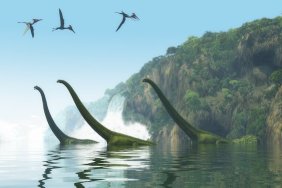Photo: Universal Pictures
Perhaps Jurassic Park would be an actual thing if that asteroid that struck into the present-day Gulf of Mexico 65 million years ago had landed almost anywhere else on the planet (like the middle of an ocean). And this is according to Japanese scientists Kunio Kaiho and Naga Oshima, who published their research in the journal Scientific Reports recently.
“I think dinosaurs could still be alive today,” if the asteroid had landed elsewhere,” Kaiho explains.
So in other words, dinosaurs were pretty damn unlucky as the new report states that only 13% of the Earth’s surface had the right factors to cause mass extinction so that asteroid landing elsewhere could have saved all these massive animals. Kaiho and Oshima believe that the asteroid’s force combined with striking oil-rich sedimentary rocks expelled approximately 1.7 billion tons of fine-particle black carbon into the atmosphere. That soot covered the sky and blocked the sun causing temperatures to drop 18 to 29 degrees over land.

“Though rain would have quickly washed most of the low-drifting soot from the sky, about 385 million tons would have remained circulating high in the atmosphere, blotting out life-giving sunlight,” National Geographic explains.
Kaiho examined post-impact soot in rock layers around the world and found that soot from samples taken in Haiti, close to the Chicxulub impact crater and only 400 miles away, resembles soot samples from Spain, thousands of miles away. “The [similarities] indicate a single source of the soot, which suggests that it was sourced from the target rocks of the Chicxulub asteroid impact,” Kaiho says. “The amount of hydrocarbon in sedimentary rocks at the impact site could have decided cooling levels across land and ocean.”
He found enough soot that it disputes an earlier theory that there were widespread wildfires caused by superheated rock falling back to Earth following the impact of the asteroid. Kaiho said that “asteroid-generated soot would not have been evenly distributed, which fits with data that suggests the Northern Hemisphere experienced more severe cooling, while the planet’s southern half recovered sooner.”
And according to the NY Times, “eighty-seven percent of Earth’s surface, places like most of present day India, China, the Amazon and Africa, would not have had high enough concentrations of hydrocarbons to seal the dinosaurs’ fate.”
So there you have it, there’s a chance dinosaurs would still be around today, although this would probably be our morning.









